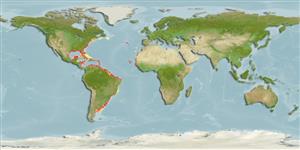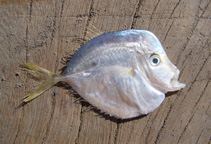Selene setapinnis (Mitchill, 1815)
Atlantic moonfish
Add your observation in Fish Watcher
| Native range | All suitable habitat | Point map | Year 2050 |

|
| This map was computer-generated and has not yet been reviewed. |
| Selene setapinnis AquaMaps Data sources: GBIF OBIS |
Upload your photos and videos
Pictures | Sounds | Google image
Pictures | Sounds | Google image
Brazil country information
Common names:
Aracorana, Doutor, Fralda-rota
Occurrence: native
Salinity: marine
Abundance: | Ref:
Importance: | Ref:
Aquaculture: | Ref:
Regulations: | Ref:
Uses: no uses
Comments: Reported from Espírito Santo (Ref. 57756). Museum: off southern Brazil, MZUSP 78163 (Ref. 47377). Also Ref. 3277.
National Checklist:
Country Information: https://www.cia.gov/library/publications/resources/the-world-factbook/geos/br.html
National Fisheries Authority:
Occurrences: Occurrences Point map
Main Ref: Floeter, S.R., J.L. Gasparini, L.A. Rocha, C.E.L. Ferreira, C.A. Rangel and B.M. Feitoza, 2003
National Database:
Occurrence: native
Salinity: marine
Abundance: | Ref:
Importance: | Ref:
Aquaculture: | Ref:
Regulations: | Ref:
Uses: no uses
Comments: Reported from Espírito Santo (Ref. 57756). Museum: off southern Brazil, MZUSP 78163 (Ref. 47377). Also Ref. 3277.
National Checklist:
Country Information: https://www.cia.gov/library/publications/resources/the-world-factbook/geos/br.html
National Fisheries Authority:
Occurrences: Occurrences Point map
Main Ref: Floeter, S.R., J.L. Gasparini, L.A. Rocha, C.E.L. Ferreira, C.A. Rangel and B.M. Feitoza, 2003
National Database:
Common names from other countries
Classification / Names Κοινά ονόματα | Συνώνυμα | Catalog of Fishes(Γένος, Είδη) | ITIS | CoL | WoRMS | Cloffa
> Carangiformes (Jacks) > Carangidae (Jacks and pompanos) > Caranginae
Etymology: Selene: Greek, selene = moon (Ref. 45335).
More on author: Mitchill.
Etymology: Selene: Greek, selene = moon (Ref. 45335).
More on author: Mitchill.
Environment: milieu / climate zone / depth range / distribution range Οικολογία
Θαλασσινό(ά); Υφάλμυρο βενθοπελαγικό; εύρος βάθους 0 - 55 m (Ref. 26912). Subtropical; 46°N - 45°S, 98°W - 16°W
Κατανομή Χώρες | Περιοχές FAO | Οικοσυστήματα | Παρουσίες | Point map | Εισαγωγές | Faunafri
Western Atlantic: Nova Scotia, Canada through most of the West Indies; along coasts of Gulf of Mexico and South America (Ref. 26938) to Mar del Plata, Argentina. Absent from the Bahamas (Ref. 26938). Replaced by Selene dorsalis in the eastern Atlantic. These two species have not been adequately studied and may prove to be conspecific. Known to occur in Mauritania (Ref. 5377).
Length at first maturity / Μέγεθος / Βάρος / Age
Maturity: Lm 20.5 range ? - ? cm
Max length : 60.0 cm TL αρσενικό/απροσδιόριστο; (Ref. 26340); common length : 25.0 cm TL αρσενικό/απροσδιόριστο; (Ref. 5217); μεγ. δημοσιευμένο βάρος: 4.6 kg (Ref. 26340)
Max length : 60.0 cm TL αρσενικό/απροσδιόριστο; (Ref. 26340); common length : 25.0 cm TL αρσενικό/απροσδιόριστο; (Ref. 5217); μεγ. δημοσιευμένο βάρος: 4.6 kg (Ref. 26340)
Short description Κλείδες προσδιορισμού | Μορφολογία | Μορφομετρία
Ραχιαίες άκανθες (συνολικά) : 9; Μαλακές ραχιαίες ακτίνες (συνολικά) : 21; Εδρικές άκανθες: 3; Μαλακές εδρικές ακτίνες: 17. Pelvic fin small (Ref. 13608). A very deep-bodied, short and strongly compressed fish. Facial profile nearly vertical and concave. Pelvic fin very short (Ref. 26938).
Adults usually found near the bottom from inshore waters to at least 54 m depth, but may form schools near the surface (Ref. 5217). Juveniles are found on muddy bottoms brackish estuaries and in coastal marine waters (Ref. 5217). Adults feed on small fishes and crustaceans. Good food fish and marketed fresh.
Life cycle and mating behavior Γεννητική Ωρίμανση | Αναπαραγωγή | Γεννοβολία | Αβγά | Γονιμότητα | Προνύμφες
Main reference
Upload your references | Αναφορές | Συντονιστής : Smith-Vaniz, William F. | Συνεργάτες
Cervigón, F., 1993. Los peces marinos de Venezuela. Volume 2. Fundación Científica Los Roques, Caracas,Venezuela. 497 p. (Ref. 9626)
IUCN Red List Status (Ref. 130435: Version 2024-2)
Least Concern (LC) ; Date assessed: 21 August 2012
Human uses
αλιεία: πολύ εμπορικό; Ενυδρείο: Δημόσια ενυδρεία
FAO(αλιεία: Παραγωγή; publication : search) | FishSource | Η θάλασσα γύρω μας
Περισσότερες πληροφορίες
Population dynamics
Παράμετροι Αύξησης
Max. ages / sizes
Length-weight rel.
Length-length rel.
Length-frequencies
Mass conversion
Στρατολόγηση
Αφθονία
Παράμετροι Αύξησης
Max. ages / sizes
Length-weight rel.
Length-length rel.
Length-frequencies
Mass conversion
Στρατολόγηση
Αφθονία
Life cycle
Αναπαραγωγή
Γεννητική Ωρίμανση
Γονιμότητα
Γεννοβολία
Spawning aggregations
Αβγά
Egg development
Προνύμφες
Δυναμική προνυμφών
Αναπαραγωγή
Γεννητική Ωρίμανση
Γονιμότητα
Γεννοβολία
Spawning aggregations
Αβγά
Egg development
Προνύμφες
Δυναμική προνυμφών
Anatomy
Επιφάνεια βραγχίων
Brain
Otolith
Επιφάνεια βραγχίων
Brain
Otolith
Physiology
Body composition
Nutrients
Κατανάλωση οξυγόνου
Κολυμβητικός τύπος
Ταχύτητα κολύμβησης
Visual pigments
Fish sound
Diseases & Parasites
Toxicity (LC50s)
Body composition
Nutrients
Κατανάλωση οξυγόνου
Κολυμβητικός τύπος
Ταχύτητα κολύμβησης
Visual pigments
Fish sound
Diseases & Parasites
Toxicity (LC50s)
Human related
Aquaculture systems
Προφίλ υδατοκαλλιεργειών
Στελέχοι
Ciguatera cases
Stamps, coins, misc.
Aquaculture systems
Προφίλ υδατοκαλλιεργειών
Στελέχοι
Ciguatera cases
Stamps, coins, misc.
Εργαλεία
E-book | Οδηγός πεδίου | Κλείδες προσδιορισμού | Ανάλυση κατά μήκος συνθέσεων | Εργαλείο ιστορίας ζωής | Σημειακός χάρτης | Classification Tree
| Catch-MSY |
Special reports
Download XML
Διαδικτυακές πηγές
Aquatic Commons | BHL | Cloffa | Websites from users | Check FishWatcher | CISTI | Catalog of Fishes(Γένος, Είδη) | DiscoverLife | ECOTOX | Faunafri | Fishtrace | GenBank(genome, nucleotide) | GloBI | GOBASE | | Google Books | Google Scholar | Google | IGFA World Record | MitoFish | Εθνικές βάσεις δεδομένων | Otolith Atlas of Taiwan Fishes | Δημόσια ενυδρεία | PubMed | Reef Life Survey | Scirus | SeaLifeBase | Δέντρο Ζωής | Wikipedia(Go, αναζήτηση) | World Records Freshwater Fishing | Zoological Record
Estimates based on models
Preferred temperature (Ref. 115969): 12 - 27.9, mean 24.4 (based on 656 cells).
Phylogenetic diversity index (Ref. 82804): PD50 = 0.5039 [Uniqueness, from 0.5 = low to 2.0 = high].
Bayesian length-weight: a=0.01288 (0.01151 - 0.01441), b=2.96 (2.93 - 2.99), in cm Total Length, based on LWR estimates for this species (Ref. 93245).
Τροφικό Επίπεδο (Ref. 69278): 3.7 ±0.52 se; based on food items.
Ελαστικότητα (Ref. 120179): Μεσαίο(α), ελάχιστος χρόνος για διπλασιασμό πληθυσμού 1,4 - 4,4 έτη (tmax=4.5; assuming tm=2-3).
Prior r = 0.54, 95% CL = 0.36 - 0.81, Based on 2 data-limited stock assessments.
Fishing Vulnerability (Ref. 59153): Low to moderate vulnerability (29 of 100).
Climate Vulnerability (Ref. 125649): Moderate vulnerability (36 of 100).





